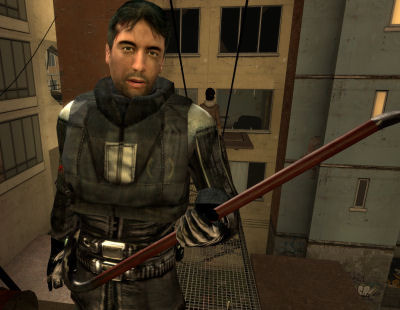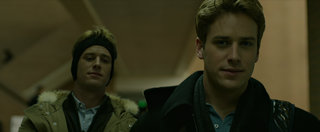Over the past year or so, I’ve been making my way through seasons 2-6 of Lost. I watched the first season on DVD shortly after it came out, and after following along with the broadcast for a couple weeks of season 2, I resolved to stop watching until I had some indication that the show would actually end (i.e. I was worried the writers would continually make stuff up and withhold any answers indefinitely). I dutifully avoided most contact with the series until early last year. By that time, the writers had declared a definite ending point and from observations of friends’ responses to new episodes, I gathered that the show was picking up steam, rather than bogging down.
As you might imagine, given the fact that I pretty much ignored the series for a few years there, I’m not a huge fan of the series. I didn’t actively dislike it either, I was just never hooked or convinced that it was going anywhere interesting. But then there were some things I was able to glean about what was happening and then Netflix made all of the seasons available on their Watch Instantly service, at which point, I had no real excuse to keep avoiding it. I burned through season 2 pretty quickly, though again, I was pretty unimpressed. Season 3 was even more of a slog, though I had been warned that this was the case. Apparently during the course of Season 3, the writers/producers agreed on an ending (or at least, how many more seasons/episodes remained). There was an almost immediate improvement in the quality of the episodes, but again, I was not terribly impressed.
Don’t get me wrong, I was enjoying myself. I had no issues burning through a bunch of episodes all at once, and having the entire series at my fingertips made that prospect all too easy. Nevertheless, I never really had a problem taking a break either. Last year, I gave up Television for Lent. Despite just having started season 3, I had no problem staying away for 40 days. Later in the year, when I had finished season 5, but season 6 wasn’t available on DVD/Netflix yet, I wasn’t all that broken up about it. If this was a show that I loved, such delays would have been quite frustrating. As it was, I’m lucky I even remembered to check for season 6.
Ultimately, I’m glad that I did. I still have a lot of issues with the series as a whole, and even the last season itself, but in the end, I found it to be a worthwhile venture. I’ve tried to avoid Spoilers for most of this post, but there are some things you may not want to know and there are definitely spoilers towards the end of the post. To summarize my thoughts, I found the ending of the series to be emotionally satisfying, but not intellectually satisfying.
This is actually an interesting reaction for me, because I usually respond in the opposite way. For example, a few years ago, I saw the movie Capote and thought it was fantastic. The writing, the acting, the direction, cinematography, just about everything about the film was extremely well done. On an intellectual level, I found it amazing. On an emotional level, I didn’t connect with it nearly as well. I have no idea why. There were a couple of scenes towards the end of the film where I kept thinking to myself This is devastating! and yet, I never actually felt devastated myself. I only really recognized the devastation on an intellectual level. There are lots of other movies I feel similarly about, and it’s a real shame, because that feeling (or lack of feeling, as it were) leaves those films feeling a bit hollow in my mind.
Lost (at least, the final season) ended up being the opposite, especially when it came to the “Flash-Sideways” sequences. Nothing seemed to make much sense intellectually, but it was emotionally satisfying nonetheless. I’m sure there are tons of people who hate those sequences. They’re full of sticky-sweet sentimentality and schmaltz. I’m a guy who doesn’t mind a happy ending, but lots of people seem to hate them. You often see these people excoriating Hollywood cinema for this sort of thing, and to be honest, they’re not entirely wrong. But sometimes they are, and for me, Lost worked. At least, in that specific respect, it worked.
I think my problems with the series have primarily to do with a few early choices that the writers seemed to get away from in later seasons. First, the series initially seemed like a science fiction story. It is not. It is a fantasy. But the writers attempted to use tropes from SF to spice up their story (in particular, the Dharma Initiative and time travel subplots), and that does represent a bit of a problem because the explanation for a lot of the mysterious happenings on the island basically amount to something like “A wizard did it!” or “It was magic!” Even when it comes to the time travel stuff, there isn’t really any science in that fiction – it’s all fantasy. There isn’t anything inherently wrong with that sort of thing, but leveraging SF tropes implies a certain plausibility that Lost could never really deliver. Once I realized this, I became a little more accepting of some of the more ridiculous aspects of the series, most of which can be summed up as: The island is a weird place and Jacob has weird powers. However, I think there were a number of times when the series established some convention or set of rules, then went ahead and broke them for no other reason than that it would, like, totally make for a sweet cliffhanger. I think this is, in large part, why the series is not intellectually satisfying for me.
This sort of inconsistency was especially frustrating from a characterization standpoint. Jack and Kate love each other, but then Kate loves Sawyer, but Sawyer’s evil, no wait he’s just a con-man with a heart of gold, but then he does something evil again, but he’s really a good guy, but no, he’s only out for himself, but then he gets married and settles down and now he wants to kill Jack, but Jack loves Juliet, but Juliet is married to Sawyer even though she really loves Jack, but they’re divorced and did I mention that Sawyer is selfish and only looking out for himself but that he’s in love with Kate, no, wait, I meant Juliet and then Ben loves Juliet but she doesn’t really care, but Jack and Juliet are divorced and Kate and Jack are together but then they’re separated and Jack wants to leave the island, but only until he wants to return to the island because it’s his destiny, but no, really it’s Hugo’s destiny, but Jack still has some sort of destiny on the island and isn’t meth awesome!?
Now, here’s the thing: most of that is actually fine. I don’t have a problem with a character who changes their mind or goes through something traumatic and is changed in the process. The issue is that many of these changes happen only because the plot requires them to, not because of a natural outgrowth or reaction of the character. Even worse, the plot often doesn’t require such twists – they’re only included to make for a snappy cut to commercial or cliffhanger ending. So you get these weird character reversals where Kate wants to leave the island, but she doesn’t want to leave, but she does, but she doesn’t. All within the course of, like, 15 minutes. I don’t know, maybe I’m exaggerating. I didn’t make a note every time I thought to myself: Wait, what? Why would this character do that? Oh dammit, end of episode, fuck! But I know I had such thoughts often. (If I ever rewatch the series, I will try to document these occurrences).
Perhaps towards the end of the fifth season and leading into the sixth, this issues seemed to straighten out a bit. I didn’t have nearly as many problems during the sixth season. Maybe that’s because my brain was so addled by the previous seasons that I knew what to expect, but still, things seemed more consistent. Of course, this only leads to my next question, which is: What the hell were the first 5 seasons for again?
I mean, there’s a very basic conflict at the heart of the Lost universe. Jacob vs. Smoke Monster. Protect the magic golden light. That’s really it. The rest of the series is basically just some messed up people trying to work through some personal issues. Some of them think the island can help, most don’t, but in the end, the island brought them together and ultimately brought out the best in them (well, in a bunch of them). That’s all background though, and the aforementioned central conflict? It isn’t even revealed in the series until, like, late in the fifth season. We don’t even hear Jacob’s name until the third season, and even when we think we’ve seen him, we haven’t.
I can accept the fact that it takes a good amount of time to establish characters and their backgrounds and the series is fantastically complex when it comes to that web of character interactions, on and off the island, in the future and in the past. But did we really need 4-5 seasons of that before we got on with the actual story?
Well, this post is turning into a bit of rant about the things I didn’t like about the series, and that’s not what I initially set out to do. None of the above is to say that the series isn’t worthwhile. Indeed, much of it could be construed as nitpicks. I don’t think it’s possible to have a show air for 6 seasons and not have such nitpicks. Shit happens. A cast member want to quit, so you need to write a quick exit (bye bye, Mr Eko!). Other cast members demand way too much money and a couple others get a DUI so they all need to be written off. These things happen.
And even then, the writers managed to build a story with, like, a hundred main characters. That sounds like hyperbole, and I suppose it is, but it’s not that far off. What’s more, most of those characters are interacting, before, during, and after their stay on the island. The non-linear exploration of such connections is actually pretty impressive in its own way. If you’re a science fiction type, you certainly won’t be impressed because there’s no real explanation beyond “Magic” or “Destiny” or “Fate” or something, but there is something admirable about the number of characters and the extent to which their stories were woven together. The “Flashback” conceit was something I was quite dubious about at the beginning of the series, but the writers managed at least one shocking twist in that respect. The “Flash-forward” was a brilliant idea, and it was quite well executed. The “Flash-sideways” of the last season was a little baffling, but quite resonant from an emotional perspective.
So we come back to my basic feeling about the series: satisfying on an emotional level, but not on an intellectual level. I have my issues with the series, but it’s still a well produced, well written series that can get addictive at times (of course, I was able to stop when i wanted as well, but there were a lot of Dammit! Ok, one more episode! moments as the writers laid one of their cliffhangers on me – even some of the lame ones that break character are still compelling in some way).


